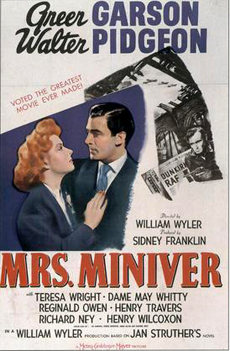William Wyler would go on to direct such cinematic classics as Roman
Holiday (1953), Ben-Hur (1959), and Funny Girl (1968).
Walter Pidgeon also played the pastor, Mr. Gruffydd, in How Green
is My Valley, and the 1941 Best Oscar winner. Henry Travers, who
plays the station agent Mr. Ballard, was best known for his later role,
as Clarence in It's a Wonderful Life (1946).
Considering that this movie was made in the midst of World War II,
it provides a unique perspective on the war. The film focuses on the
Miniver family, in particular Mrs. Miniver, played by Greer Garson,
a kindhearted, graceful woman who has a benign influence on her neighbors.
For her sweetness and beauty, a neighbor, Mr. Ballard, names his prize
rose after her, which he enters in a local flower competition.
Her husband, Clem Miniver, played by Walter Pidgeon, is a genial, hardworking
architect. Although they live comfortably, they are not nearly as rich
as the nearby nobility, namely Lady Beldon (Dame May Whitty) and her
granddaughter, Carol (Teresa Wright, who won Best Supporting Actress).
Soon, Carol begins a romance with the oldest Miniver son, Vin, an idealistic
young man who interrupts his college education to join the RAF.
Director William Wyler, born in Germany, openly admitted that he made
the film to build American support for the war. Yet, the subject is
handled so delicately that the film avoids the jingoistic fervor that
tainted other wartime movies. Instead, we meet a village full of people,
trying to live normal lives while assisting the war effort. Ironically,
Wyler joined the Army after completing the film and was overseas on
the night he won his first Oscar. He later said his war experiences
showed him that the film portrayed war in too soft a light.
In a particularly moving scene, Mr. and Mrs. Miniver read Alice
in Wonderland to soothe their youngest children as they huddle in
a bomb shelter, the noise of direct strikes coming uncomfortably close.
As they read calmly about Alice's escape into a magical realm, the parents'
eyes show their desire to escape their reality, as well.
The Minivers aren't self-consciously heroic: they simply do what needs
to be done. Clem volunteers to evacuate Allied troops from Dunkirk,
using his private boat, along with hundreds of other British citizens.
And Mrs. Miniver must cope with a desperate German pilot, who stumbles
across her path after his airplane is shot down.
The script is amazing, as the family interaction varies between loving
laughter and more somber moments, without ever veering into melodrama.
Instead, this movie shows that the smallest actions, like a village
gathering for an annual flower show despite bombing raids, can be acts
of heroism.
One of the most remarkable aspects of the cinematography is the way
that, in tandem with creative set design, it shows the devastating effects
of the Blitz. Rather than sweeping shots of devastation, the camera
shows us intimate views from the perspective of the main characters,
beginning with close-up of the characters' faces and only gradually,
first in the corners and then growing larger, a view of the bombed out
location that surrounds them.
The film ends with a call for solidarity, as the pastor joins together
the devastated town members and declares the fight the people's war,
asking everyone to join together. While that sounds heavy-handed when
taken out of context, the speech instead feels inspirational, as the
pastor speaks to a grieving population and vaults them into hope and
action.
That rousing speech was translated into multiple languages and air-dropped
in leaflets over German-occupied territory, broadcast over the Voice
of America and reprinted in Time and Look magazines at
President Franklin Delano Roosevelt's request. It has come to be known
as the Wilcoxon Speech, in tribute to actor Henry Wilcoxon's stirring
delivery.
Over the end credits, a graphic urges viewers to buy war bonds and
to support the U.S. war effort, something you'd never see in a current
movie. This was truly another time, a different war.
Greer Garson is well cast in the title role. Even in the moments where
she's not speaking, she speaks with her eyes. She is a master of the
art of the micro expression, the fleeting moments of fear that flit
across her face before she musters courage to do what she must. Interestingly
enough, she would have declined the role, since it involved playing
a mother but was contractually obligated. For her efforts, she won Best
Actress. In another startling fact, Greer Garson went on to marry Richard
Ney, who played her son Vin in the movie.
Walter Pidgeon plays against Greer convincingly as a longtime husband,
and their playful good humor serves to strengthen the family through
trying times. They would revisit those roles in the postwar film, The
Miniver Story, which recounts the family's efforts to rebuild their
lives.
The Miniver children are endearing but not cutesy, often blurting out
inappropriate statements, the way children do, such as suggesting to
a family servant, off to the front lines, that he can write them a letter
in blood! This sort of dialogue, again, anchors the film in reality,
reminding the viewers that similar stories were still happening overseas
at the time the film was made.
While only those who lived through the German Blitz can say how accurately
Mrs. Miniver reflects the attitudes of Brits during those trials,
this multitextured portrayal does an admirable job of providing a contemporary
perspective. The film also served its purpose: Winston Churchill once
said that this film had done more for the war effort than a flotilla
of destroyers.
Rating (out of 5): ****
Musings
on Best Picture Winners


